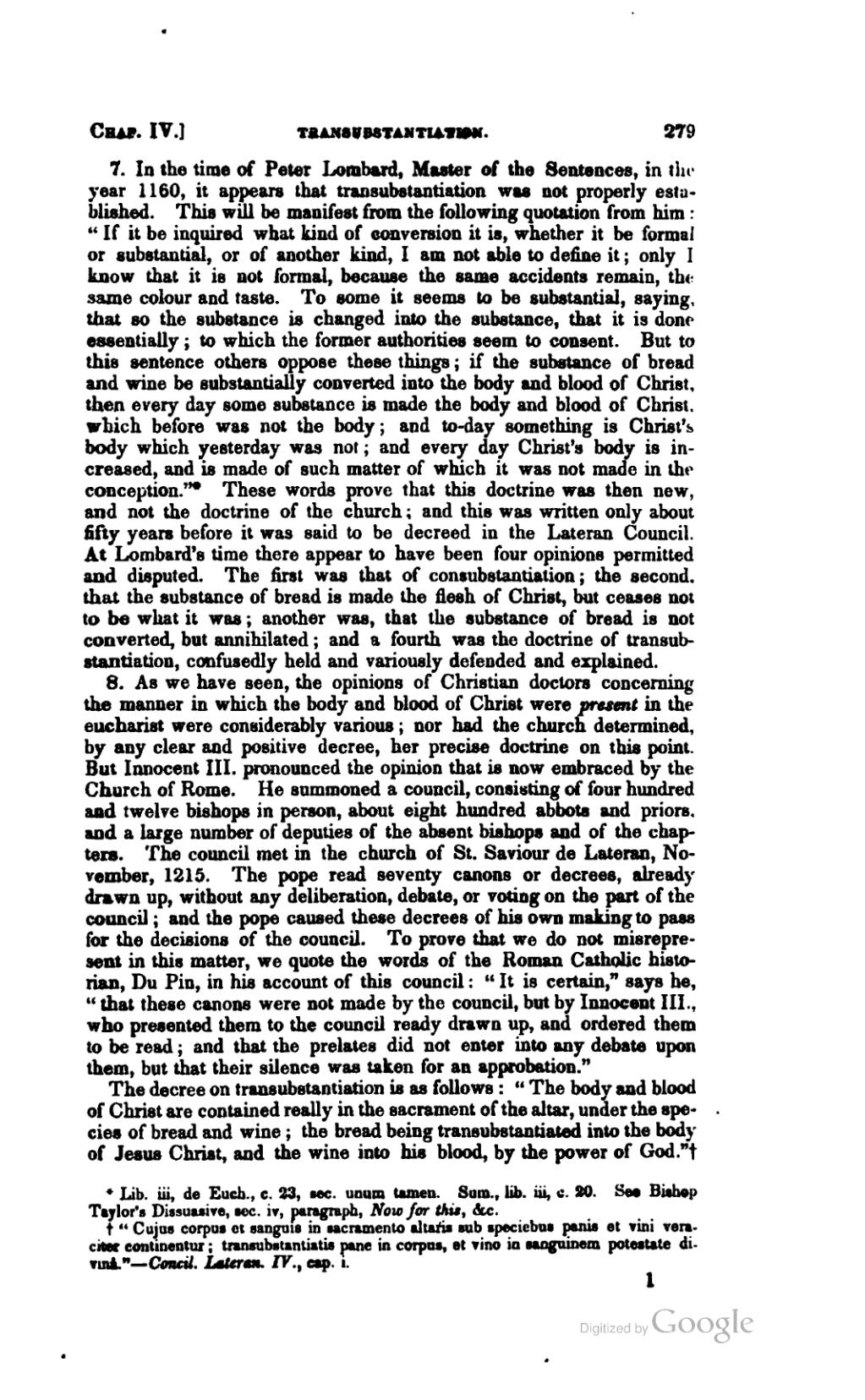7. In the time o? Peter Lorabsrd, Mnster of the Sentences, in fl,, year 1150, it appears that tr&nsubstantiation was not properly estu- b]ished. TtLIS will be manifest from the following quotation from him: ,, If it be inquired what kind of conversion it is, whether it be formal or substantial, or of another kind, I am not able to define it; only I know that it is not �ormal, because the same accidents remain, the same colour and taste. To some it seems to be substantial, saying, that so the substance is changed into the substance, that it is done essentially; to which the former authorities seem to consent. But to this sentence others oppose these things; if the substance of bread and wine be substantially converted into the body and blood of Christ, then every day some substance is made the body and blood of Christ. which before was not the body; and to-day something is Christ's body which yesterday was not; and every day Christ's body is in- creased, and is made of such matter of which it was not made in the conception. "�se words prove that this doctrine was then new, and not the doctrine of the church; and this was written only about fifty years before it was said to be decreed in the Lateran Council. At Lombard's t/me there appear to have been four opinions permitted and disputed. The ftrst was that of consubstanthtion; the second. that the substance of bread is made the flesh of Christ, but ceases not to be what it was; another was, that the substance of bread is not converted, but annihilated; and a fourth was the doctrine of transub- stantiation, confusedly held and variously defended and explained. 8. As we have seen, the opinions of Christian doctors concerning the manner in which the body and blood of Christ were p,'f?mt in the eucharist were considerably various; nor lust the church determined, by any clear and positive decree, her precise doctrine on this point. But Innocent III. pronounced the spin/on that is now embraced by the Church of Rome. He summoned a council, consisting o/four hundred and twelve bishops in person, about eight hundred abbot= and priors. and a large number of deputies of the absent bishops end of the chap- ters. The council met in the church of St. Saviour de Lateran, No- vember, 121�he pope read seventy canons or decrees, already dr?wn up, without any deliberation, debate, or voting on the part of the council; and the pope caused these decrees of his own making to pass for the decisions of the oouucil. To prove that we do not misrepre- sent in this matter, we quote the words of the Roman Catholic histo- rian, Du Pin, in his account of this council: "It is cer?in," says he, "that these canons were not made by the council, but by Innocent III., who presented them to the council ready drawn up, and ordered them to be read; and that the prelates did not enter into any debate upon them, but that their silence was taken for an approbation." The decree on transubstantiation is as follows: "The body and blood of Christ are contained really in the sacrament of the altar, under the spe- cies of bread and wine; the bread being transubstant/ated into the body of Jesus Christ, and the wine into his blood, by the power of God."?* �Lib. 'tii, de ]Cuch., c. 23, sec. unurn tamcu. Sum., lib. iii, c. ?0. See Bishop Taylor's Dissuasive, see. iv, paragraph, Now for fl?, itc. t "Cujus corpus et sanguts in sacramento altalb sub sp?c. ielms ? et vini vera- c?ter eontmentur; trL*tmlbstant?atis pane in corpus, et vine m saogumem potestate vmA.'*--Cm?. Lsr?.sx. llr., cop. ,. t
�
